Environmental Initiatives
Our growing renewable energy assets reflect our commitment as a partner to the environment.
The Aboitiz Group’s adherence to sustainable business practices and social responsibility is key to its success story for the past 100 years. Today, AboitizPower’s ESG strategy addresses balancing business growth with sustainability initiatives. It does so by accounting for the impact of its activities on people, planet, and prosperity, and with a view to its long-term implications. In replicating this success for future generations, AboitizPower intends to strengthen its ESG standards and practices by reinforcing its purpose of “Transforming Energy for a Better World” and taking advantage of emerging technologies and innovations as the Aboitiz Group undertakes its “Great Transformation” into the Philippines’ first techglomerate. This is amidst the country’s continued post-pandemic recovery and transition to a decarbonized economy.
People are our most important priority. Aboitiz has made it a point to implement fair and beneficial business practices in the Philippines that align with the UN Sustainable Development Goals. These practices are directed to the organization’s team members, customers, communities, and society.
Through its environmental programs and initiatives, the Aboitiz Group remains consistent with its campaign toward A Better World. We observe year-round compliance with mandatory requirements. This ensures that the company, with its full operations, does not negatively impact the environment and promotes sustainability in the energy sector.
The AboitizPower Group adheres to fair business practices that align both majority and minority interests in growing profitably. This has guided the company for generations and propelled it to become one of the best-managed companies in the region, enjoying a high level of trust and confidence from its stakeholders.

[GRI 3-1, 3-2, 3-3 (2021)] In 2023, we continued our commitment to our sustainability journey and our stakeholders by undertaking a materiality assessment. Materiality assessment is an essential process for identifying, prioritizing, and reporting on environmental, social, and governance (ESG) issues that are significant and have an impact (positive or negative) on our company and stakeholders in the short and long term. This assessment will guide us to develop our ESG and broader business strategy, reporting, and decision-making processes.
Process to determine material topics:
At the outset, the organization defines the materiality assessment's scope, objectives, and methodology. This includes determining the operation scope, the stakeholders to be considered, the timeframe, and the sustainability dimensions (environmental, social, governance) to be assessed.
This includes identifying Material Issues through a desktop review of sustainability frameworks and standards (e.g., GRI, SASB, CDP, TCFD) and gathering insights from various sources, including industry reports, peer reviews, regulatory landscapes, and stakeholder expectations.
Stakeholder engagement is crucial for a holistic assessment. Interviews, surveys, and focus groups are conducted with internal and external stakeholders, including employees, customers, suppliers, investors, local communities, and regulators. This step aims to gather qualitative insights and perspectives on the importance and impact of various issues. This activity aims to gather more profound insights into priority material topics and expectations for the company.
This involves mapping the identified issues against their potential impact on the organization and its stakeholders. Impact mapping helps visualize each issue's influence on business operations and stakeholder well-being, thus providing a clearer picture of where significant impacts might occur.
Issues are categorized based on common themes or sustainability dimensions (e.g., environmental impact and social practices). Categorization aids in organizing issues into manageable groups for better analysis and action planning.
The categorized issues are then prioritized based on criteria such as severity of impact, stakeholder concern, business implications, and the ability to influence the problem. Prioritization helps identify which issues are material and should be addressed as part of the organization’s sustainability strategy.
The final step involves validating the results of the materiality assessment with key stakeholders. This could include discussions with senior management, stakeholder feedback sessions, or third-party expert reviews. Validation ensures the findings are accurate, credible, and aligned with business objectives and stakeholder expectations.
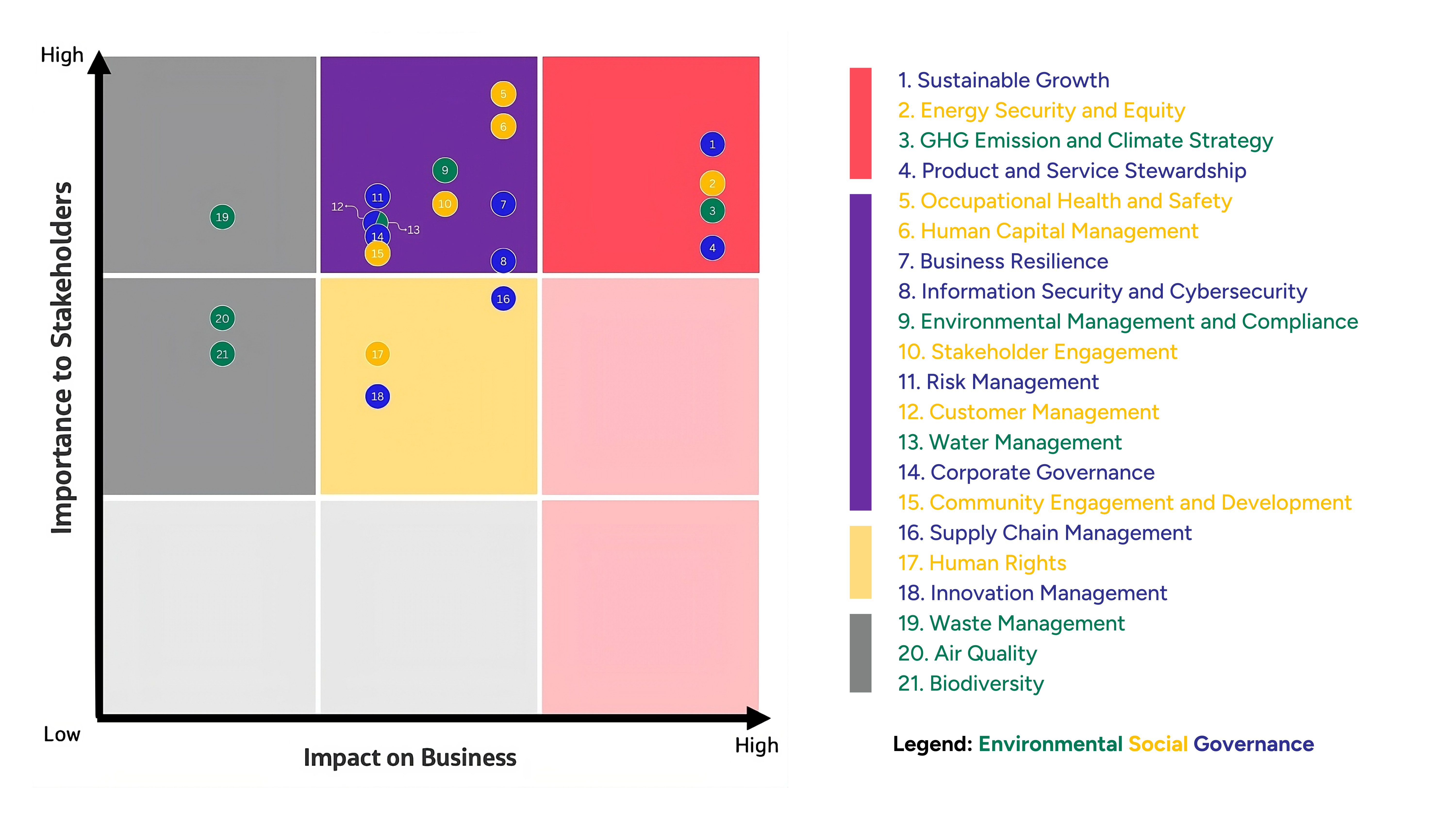
Information as of December 31, 2024 unless stated otherwise
Revenues
2023: ₱ 207.10 billion
2022: ₱ 193.99 billion

Attributable Renewable Capacity
2023: 928 MW
2022: 928 MW

Total Number of Employees
2023: 3,681
2022: 3,425

Shareholder Earnings
2023: ₱ 33.1 billion
2022: ₱ 27.5 billion

Energy Generated
2023: 23,437 GWh
2022: 19,517 GWh

Percentage of Women in Workforce
2023: 31%
2022: 29.64%

EBITDA
2023: ₱ 67.9 million
2022: ₱ 57.60 million

Total Waste Generated⁴
2023: 62,799 tons
2022: 50,781 tons

Total LTIFR
2023: 0.42
2022: 0.35

CSR Contribution:
2023: ₱ 235 million
2022: ₱ 155 million

Total Water Consumption
2023: 7.7 million m3¹
2022: 838,872 m3

Total TRIR
2023: 0.67
2022: 0.57

Employees informed of anti-corruption policies

Trees planted
2023: 353,975
2022: 743,092

Total Fatality
2023: 0
2022: 1

Employees disciplined/dismissed for corruption
2023: 0
2022: 0

Energy Consumption
2023: 791,408 Mwh
2022: 743,092 Mwh

No. of legal actions or employee grievances involving forced or child labor
2023: 0

Environmental Penalties Incurred
2023: 0
2022: 0

GHG Intensity (generation)
2023: 0.481
2022: 0.435

GHG Intensity (distribution)
2023: 0.059
2022: 0.050

The Aboitiz Group uses the integrated format for the corporate report and consolidation of Aboitiz Equity Ventures, Inc., Aboitiz Power Corporation, and Aboitiz Group Sustainability. It is a format that underscores our commitment to the holistic and transparent reporting of our business performance and its overall impact on our stakeholders and society.
The report documents the Aboitiz Group’s initiatives and activities for people, the planet, and profit, anchored on our Group purpose and the brand promise of “transforming energy for a better world.”
We have progressed in various focus areas such as team member engagement and development, corporate social responsibility, customer focus, disaster resilience, carbon emissions reduction, resource efficiency, renewable energy, waste management, financial growth, and financial returns.
Through the years, the company has communicated its commitment and initiatives on corporate governance and sustainability to engage team members and external stakeholders.
ESG Ratings are independent assessments conducted at AboitizPower based on different ESG criteria and frameworks. They help us objectively measure the company’s sustainability performance and serve as one input to continuously improving our operations.
S&P Global has assessed Aboitiz Power Corporation through the Corporate Sustainability Assessment (CSA), which incorporates a hundred points of analysis linked to sustainability, ranging from economic and governance to environmental and social data points. S&P Global Corporate Sustainability Assessment (CSA) is an annual evaluation of companies’ sustainability practices that focuses on sustainability criteria that are both industry-specific and financially material.

Sustainalytics’ ESG Risk Ratings measure a company’s exposure to industry-specific material ESG risks and how well it manages those risks. This multidimensional approach combines the concepts of management and exposure to arrive at an absolute assessment of ESG risk, which is measured in five levels: Negligible, Low, Medium, High, and Severe risk.

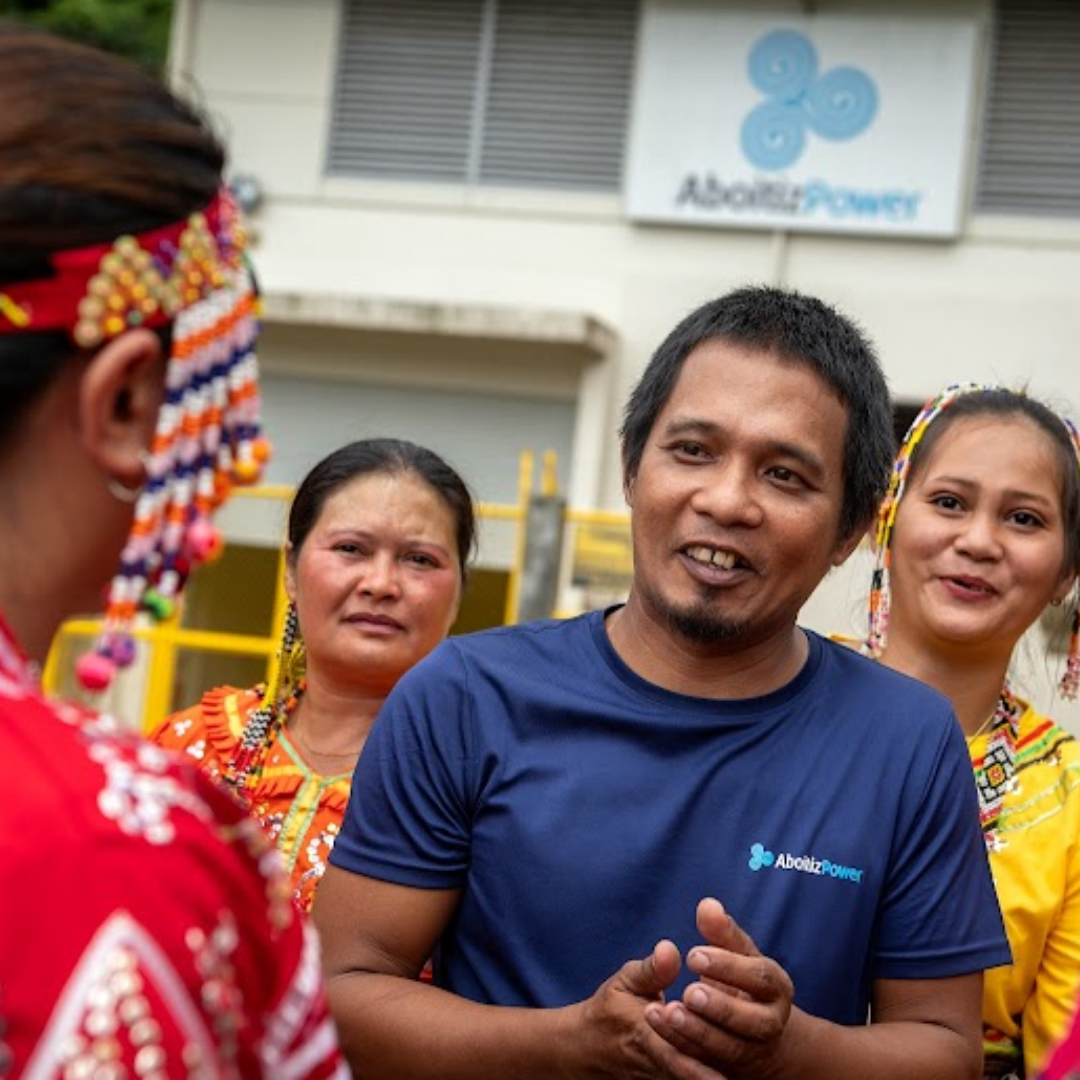
We can do well by always doing good and making the right long-term decisions that balance the interests of people, planet, and profit.
The following principles guide us:
We make decisions based on our objectives to:
We are committed to making Aboitiz a sustainable enterprise that we can entrust to future generations. We can do well by doing good, always making the right long-term decisions that balance the interests of people, planet, and profit.
We recognize the critical importance of aligning our pillars with the United Nations’ Sustainability Development Goals (UN SDGs) to identify where our actions could have meaningful impacts in supporting global sustainability outcomes. AboitizPower has identified SDGs 7 (Clean and Affordable Energy), 8 (Decent Work and Economic Growth), and 12 (Responsible Consumption and Production) as our priority SDGs in which we create the most impact.
Our key initiatives on those SDGs are as follows:
| UN SDGs | UN SDG Target | Key Initiatives |
|---|---|---|
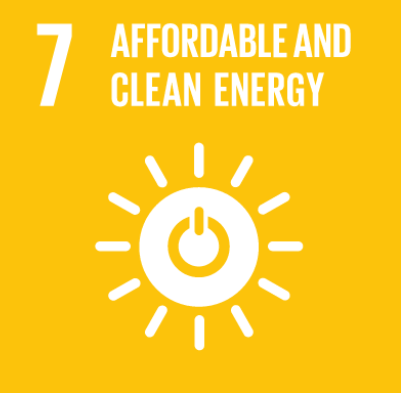 |
|
|
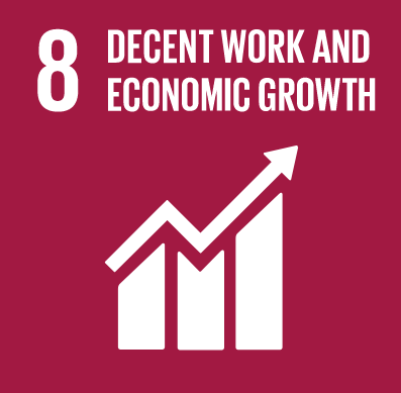 |
|
|
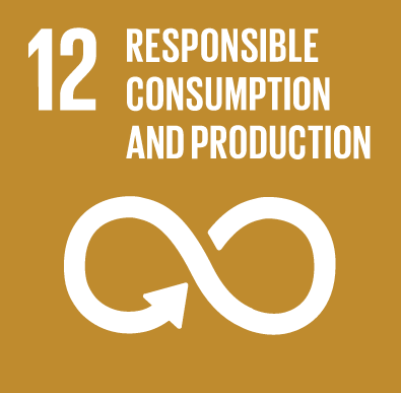 |
|
|
Additionally, AboitizPower ensures that its ESG initiatives contribute to achieving balance in the three pillars of sustainability, thus directly or indirectly contributing to other SDGs.
AboitizPower champions ethical practices and sustainability in the Philippines, anchoring our practices on the tenets of ESG leadership: accountability, transparency, and fairness. Our sustainability initiatives will benefit every stakeholder, including shareholders, partner communities, and employees.
We’re passionate about empowering a nation, nurturing our employees, and protecting the environment. Discover more about AboitizPower’s initiatives and how they are the product of our ESG leadership practices in the Philippines.
Our growing renewable energy assets reflect our commitment as a partner to the environment.
Our commitment to nurturing the welfare of our members and the community shows our dedication as a partner to people.
Our corporate transparency and quality assurance of business output uphold our integrity as a partner in good governance.
Empowering the hopes and dreams of the nation’s people through our projects is what drives us to be an unwavering partner to the community.
Aboitiz Power Corporation (AboitizPower) received its fourth Golden Arrow Award in a row, improving to a 4-arrow recognition after scoring 105.52 out of 130 in the 2024 ASEAN Corporate Governance Scorecard (ACGS). The assessment measures a publicly-listed company’s performance with respect to the rights and equitable treatment of shareholders, sustainability and resilience, disclosure and transparency, and board responsibility.
Aboitiz Renewables, Inc., through its geothermal arm AP Renewables Inc., was given the prestigious ASEAN Occupational Safety and Health Award, making it the only Philippine organization recognized this year.
AboitizPower was recognized as a sustainability champion by publishing company The Manila Times. The criteria for selection considered initiative, impact, inclusiveness, and integration of “environmental, social and governance initiatives and circular economy efforts”, as well as compliance with the United Nations Sustainable Development Goals or UN SDGs.